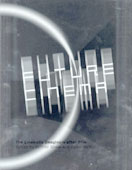


Italian version
 . book
. bookJeffrey Shaw, Peter Weibel
Future Cinema: The Cinematic Imaginary After Film
<book> The MIT Press
ISBN 0262692864
The movie industry is one of the most conservative ones when it comes to new models of production and enjoyment. The historic 'broadcast' model, where few big companies handle the distribution of movies for theaters and home videos hasn't changed much in the last century. But the germs of a personal reappropriation of the media, which affirm the freedom of the individual to modify the closed loop production - distribution - watching, have already appeared in the last decade of the last century in experiments, art works and installations which have used more and more the subdivision of the screen, the rediscussion of narrative sequentiality, the spatial dimension of the image, the inclusion of illusion in simulation, the contamination with other languages (videogame, television, computer interfaces), the self-generation or the direct interaction with our sense of vision. Thus, the 'post-cinematic' condition is the fulcrum of the expositions catalogued in this book, both the one organized by ZKM and the following one at the ICC in Tokyo. With a graphical interface which allows to precisely single out the different elements, the book flows through the history of collective vision and its technological and conceptual innovations. The sequence of images and its endless possible recombinations are the prime example of the transformations which have undergone one of the most important changes with the spreading of personal media which make possible to manipulate every frame of a film, dispelling the magical aura of cinema. Even if some significant practices (such as the amateurial mashup of famous films or the digital modification of rent videotapes) aren't mentioned here, the chronology and the analysis of the works is exceptionally complete.